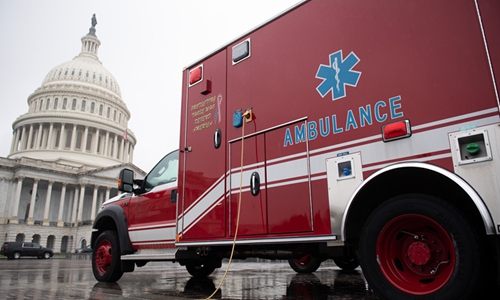HOME >> OPINION
Federal, state dysfunction hampers US virus fight
Source:Global Times Published: 2020/3/30 21:13:40

An ambulance sits outside the US Capitol in Washington, DC, Monday. Photo: AFP
Since the viral outbreak of COVID-19 in the US, there have been a number of serious clashes between the federal and state governments. US President Donald Trump was considering imposing a quarantine on three states including New York on Saturday, which New York Governor Andrew Cuomo described as a "federal declaration of war."The US federal government and a number of states have been at serious odds over coronavirus prevention measures. The White House has mainly focused on the country's economy, which has been severely impacted by the pandemic over the past few weeks. Trump and his Republican party have pinned much of their reelection hopes on the previously robust economy, and their proposed policies to revive it have run contrary to what state governors say they need to cope with pandemic.
For example, the Trump administration had suggested the country could reopen for business by April 12, which is far from feasible for states hit hard by the virus such as New York, which has shut down all nonessential businesses.
The Trump administration at first downplayed the threat from COVID-19, was slow to implement measures and failed to provide states with the resources they needed to defend against the coronavirus. Even when some states and cities were in dire need, the federal government was unable to provide necessary equipment in time. The federal government has finally begun to realize the severity of the situation, but the new measures rolled out by Washington may be far from enough to meet states' demand.
The US federal government has been slow to coordinate control measures with states to combat the coronavirus. This stalemate in governance has led to criticism and reduced people's trust in the federal government. This in turn has hindered the states from accessing much needed resources under federal government's control. The US political system, under which every state puts its own interests first, makes coordinating efforts not an easy task.
Trump's reelection bid has influenced the federal government's policymaking. Pumping up the US economy has been his key accomplishment, but the epidemic has impacted his efforts. As the virus spreads across the US, the federal government's inefficiency has been repeatedly exposed. This is not good news for Trump and has led him to taking radical measures to show his administration's governing capability.
The federal government and states have obviously not done enough to coordinate with each other. Given the flawed mechanism of coordination between the federal government and states, disputes will certainly occur, especially when Trump is making policy designed to boost his approval rating.
The US is proud of its political system, which however has failed to carry out sound pandemic prevention, and some people have advised the US to learn from South Korea's measures in tackling the virus. South Korea's experience is to some extent been similar to China's, which provided a reliable reference to Seoul. The US is loath to publicly admit it has lessons to learn from China.
The US is in need of international aid to resolve the severe lack of personal protective and medical equipment. By asking his South Korean counterpart Moon Jae-in for help, Trump has publicly sent a message that the US needs outside help. After Trump's phone call with Chinese President Xi Jinping, he praised China's efforts in fighting COVID-19, saying the US and China "are working closely together." Although Trump didn't say aid would be coming from China, US society has already reached out to the Asian giant.
The US federal government is unlikely to radically change its tact unless the outbreak goes severely viral. The US government has been criticized for wasting the precious time it had been given by China's lonely first fight against the virus. The Trump administration should listen to its people and think clearly about what its helpful next steps.
This article was compiled by Global Times reporter Xu Hailin based on an interview with Su Hao, the founding director of the Center for Strategic and Peace Studies at the China Foreign Affairs University. opinion@globaltimes.com.cn
RELATED ARTICLES:
Posted in: VIEWPOINT